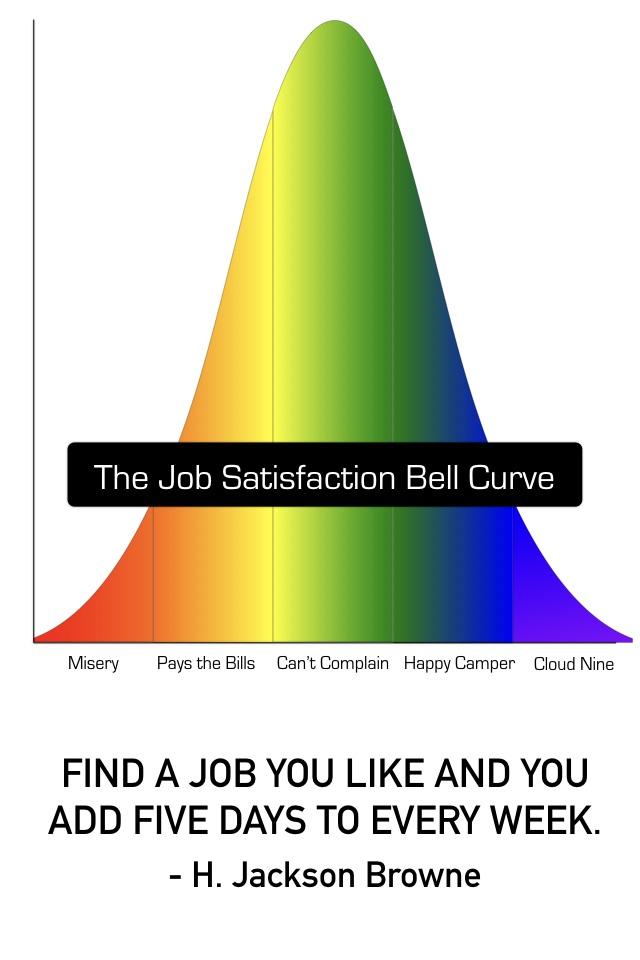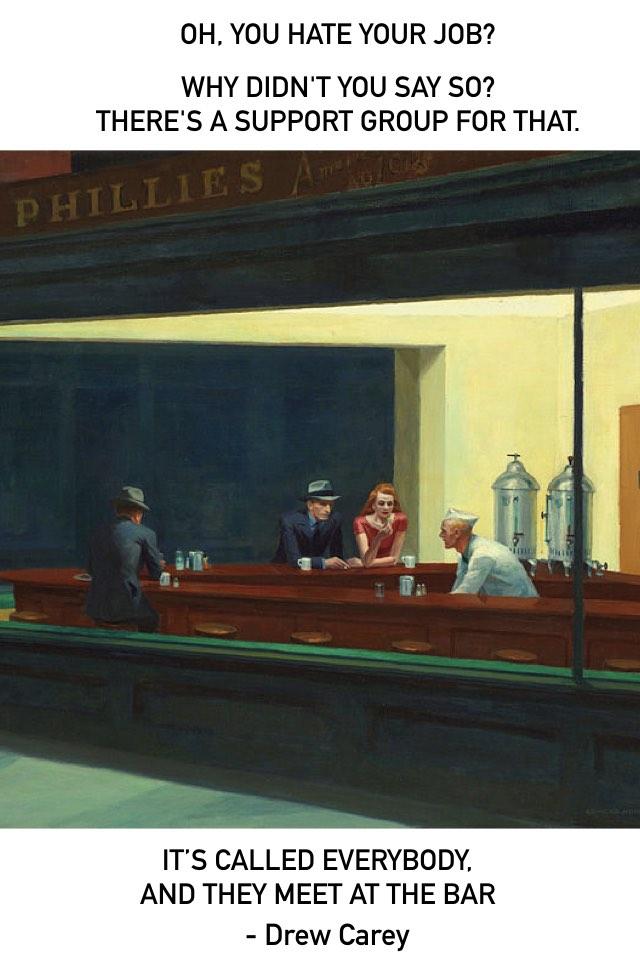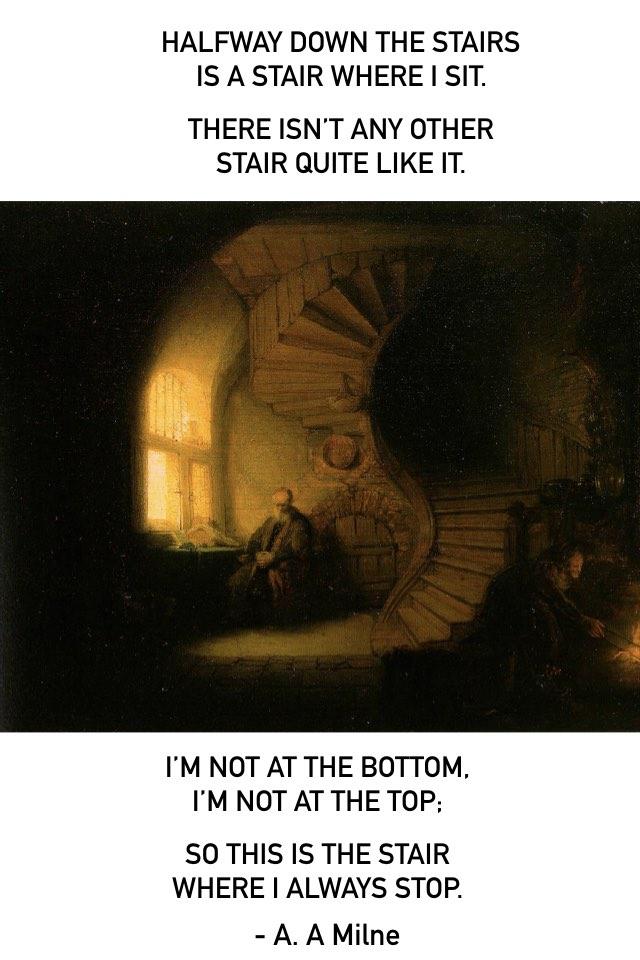Career Book
The Quest for Rarified Job Satisfaction
* An excerpt from Chapter Four of The Different Drummer: Follow your own beat to find enlivening work and lead an extraordinary life

Myths typically commence with the appearance of a herald whose role is to entice a person to leave their ordinary world and discover an extraordinary one. In terms of our vocational journeys, the herald often takes the guise of job dissatisfaction.
Job Satisfaction Surveys
Gallup is a consulting firm which conducts public opinion polls. In 2018 they revealed their latest findings which showed 87% of workers are not engaged (read passionate) about their work.
Australian surveys tend to be on par, with Gallup finding that 20% of people are actively disengaged - meaning they are either disruptive, unproductive, disloyal or all of the above. A further 62% were neither engaged nor committed to either their role or their employer. If these figures are sobering, spare a thought for workers in Singapore and China, of which a staggering 98% of people report being disengaged.
Upon learning that only 13% of Germans felt happy about their work, the advertising firm Scholz & Friends created over twenty visual depictions of people being trapped in dispiriting service jobs. The slogan they adopted for the campaign: “Life’s too short for the wrong job.” In tapping into the deep vocational misalignment in the collective psyche, the ads went viral and the job search site they were promoting saw its traffic skyrocket.
Another job site to harness the zeitgeist of unfulfilling workaholism was Monster.com, which parodied Nike’s aspirational approach. It showed a succession of children speaking about growing up and savouring the multitude of employment humiliations awaiting them in the corporate world. The ad starts with a child proclaiming, “When I grow up, I want to file all day.” Triggering nostalgia for that moment in time where we once felt hopeful about career possibilities, it provoked a reaction that made its website a household name overnight.
Evolving Expectations
From a historical perspective, the idea that people should love what they do for work is a recent one. It challenges the entrenched belief that work is something to be endured. Millennials are leading the charge, with consulting firm Deloitte finding that 7 out of 10 of them want to be creative at work. Furthermore, they want their work to be meaningful with more than 7 out of 10 expecting their employers to focus on societal problems.
Previous generations have underestimated the importance of job satisfaction. With burgeoning choice and more awareness of concepts like Maslow’s Hierarchy of Needs, things are changing.
As we step through the five levels of job satisfaction in this chapter, consider where you find yourself and ask yourself whether or not you are among those who have stopped searching too early.
🎦 Monster.com advertisement - “When I Grow Up…”
Level 5 - Misery
Perhaps there are not so much terrible jobs as there are jobs that are a terrible match for our individual preferences. The social scientist Malcolm Gladwell believes that when it comes to finding fulfilling work, we need three things: autonomy, complexity and a correlation between effort and reward.
I thought about this while sitting in an optometrist’s chair. Surely looking at people’s eyes all day couldn’t be very appealing? So I asked her if she found her job enjoyable. She told me that having spent years in hospitality while at university she now found it liberating to no longer have to answer to bosses. She liked the challenge of determining defects in people’s sight and spoke of the fulfilment that came from improving a person’s quality of life. Not only was she meeting Gladwell’s requirements for job satisfaction but she also relished the social aspect to the work and found herself constantly meeting interesting people.
Majorly Mismatched
How you feel about a job is determined by how closely it aligns with how you are wired. The state of extreme dissatisfaction comes from doing repetitive, unchallenging work, involving interaction with people with whom you have little in common.
Over the years I have had plenty of jobs that have failed to inspire - washing dishes in midsummer, delivering pizzas in a sprawling city where I continually got lost, doing the graveyard shift in a takeaway, robotically rolling newspapers into plastic bags, delousing kids at a summer camp and countless others.
Despite the tedious nature of the roles, they each had aspects that made them bearable, unlike my stint doing data entry where I did nothing but type numbers into a computer hour after hour. On top of the monotony, I was in a regimented environment where even the toilet breaks were timed. There was no social interaction to break the dullness, no challenge, no creative input and the work felt entirely meaningless.
Anaïs Nin once said that there is something inherently ugly about doing a job we don’t care for. Cities spend enormous sums of money employing architects and designers to make our physical landscapes more pleasing. Imagine if civic bodies directed a similar amount of energy into beautifying our working lives? Unless this occurs, people will continue working half-heartedly or forever cycle through one unsuitable job after another.
The Only Way Is Up
Ironically, extreme job dissatisfaction can often become our herald or catalyst for change. Reaching a certain level of despondency can get us thinking about what else might await us, as well as galvanise us into the state that Elizabeth Gilbert called ‘NOT THIS!’
Consider the example of Alan Hughes. He was both creative and civically minded but found himself working as a sheet-metal worker in a factory surrounded by people who hated their work. It was repetitive, detached from any sense of meaning and performed in a hostile environment. He returned home each day thoroughly dispirited. The extent of his despair prompted him to retrain and study visual communication at an evening college.
Upon graduating, he left the factory to become a graphic designer for an organisation that shared his value system. He found his tribe and a sense of fit in the human rights magazine New Internationalist. After his gifts were given an opportunity for expression, he went on to write articles for them as well. Having discovered work that vivified him, Alan flourished there until retiring thirty years later.

Level 4 - Pays The Bills
Following our bliss is energising. Work, by contrast, is depleting. Author Michel Tournier claims this goes to show it is at odds with human nature.
As a person moves beyond extreme misery on the satisfaction spectrum they reach the time-server mindset.
In The Career Chase, Helen Harkness shares an example of how one worker remained with the same company, year after year, simply because they enjoyed the free cake that was doled out each day.
At this level, work still lacks meaning, it only occasionally engages us and is undertaken primarily to earn a living. Energy is diverted into activities outside of work and only the compensations of an income maintain one’s resolve to continue.
The Hibernation Of Joy
I noticed this state while working in a bank with colleagues who had been there for over thirty years.
None of them hated their jobs per se but neither were they passionate about it. Their days were punctuated by coffee breaks, dollops of gossip and periodic laughter. Each had raised families, which served to help break up their sentences. After their kids left the nest, they looked to long weekends or annual holidays to reignite any zest for life. Between the tedium of the work and constant haranguing from management, my colleagues eagerly counted down till retirement.
Terrified of inheriting the same fate, I got out before any gangrene of the soul could set in. After battling to accept the constriction of conventional work life, Henry David Thoreau observed how rare it was for people to break out:
I wish to suggest that a man may be very industrious, and yet not spend his time well. There is no more fatal blunderer than he who consumes the greater part of his life getting his living. You must get your living by loving. But as it is said of the merchants that 97 in a 100 fail, so the life of men generally, tried by this standard, is a failure.
When Michael Caton took his first job as an office boy he also worked with people who had planted themselves in the same place for over thirty years. Quickly realising that the same destiny lay in store for himself, he sought out something he was inspired by. After approaching a friend working in the theatre he took a part which kick-started his career as an actor. He has gone on to work for over forty years in his profession and, unlike time-servers, he has cherished his working life and the adventures it has taken him on.
Professionally Exhausted
If undemanding jobs leave people feeling bored or serving time, then speaking to those in many professional occupations reveals a different set of challenges. The 8-hour/5-day weeks endured by my fellow bankers and I were considered utopian compared to the endless hours, excessive pressure and stress the professionals had to contend with. Were the work richly satisfying this might be tolerable but disengagement statistics are similar.
In her book, Willing Slaves, Madeleine Bunting reveals how much modern workplaces demand from people. As one overworked employee described it:
By the time we've had supper and washed up, we're shattered. There's a huge amount of recovering at the weekends as well as the domestic chores we just can't face in the evening such as cleaning, washing, and shopping. I feel I'm just existing - not living. It's not the hours but what goes on in those hours - the tremendous drain on my emotional and mental energy.
Animosity Bred by the Commodity Worldview
Having spent years at the executive level being responsible for extracting as much as possible from employees, Nigel Marsh came to the frightful conclusion that modern workplaces act as abattoirs of the human soul. After having this epiphany he went on to make it his life’s work to expose the swindle and argue a better way to ‘employ’ human capital.
After becoming jaded from writing dry economic reports for a power company, Corinne Maier published a book, Hello Laziness, advocating a philosophy of active disengagement. It was her response to what she saw as the deadening impacts of corporations extracting human capital. Her message struck a chord with many workers and became the second highest selling book in her homeland of France in the year of its release.
Marie Cooley decided to take things a step further than the two previous people. Writing and speaking out wasn’t enough. She decided to take direct and immediate action. During the height of the Global Financial Crisis, she worked as an administrative assistant. The atmosphere was full of mistrust as employees lost their jobs in droves at the same time that unscrupulous management was emptying their retirement funds.
Upon noticing a job in the newspaper that detailed her work duties and included her boss’s phone number she became enraged at the thought of being covertly replaced. Marie went into her office late at night and deleted millions of dollars worth of architectural drawings and blueprints from the servers of her workplace. Only after her sabotage did she find out that the job being advertised was for the boss’s wife’s company. He just happened to be handling the recruitment.
Office Space meets Falling Down
I witnessed a similar act take place in a workplace when a loyal and devoted colleague was pushed out of his job due to personality differences with his manager. On his day of departure, he deleted every email and contact detail pertaining to his role in order to make it a nightmare for the person taking over his position.
But it is not just employees reacting vehemently to low levels of job satisfaction and loyalty. Zappos, an American firm, employs a hyper form of retrenchment. Part-way through their training induction, new staff are each offered a $2000 bonus to leave the job on top of being paid for their training. Their reasoning is that having tasted the company’s culture and nature of the work they would prefer people to leave swiftly if they feel it is not for them.
Whether we wile away the years doing unchallenging roles or risk being wrecked by extracting the highest income from high-stress work, settling for low-levels of job satisfaction carries a huge toll.
Time-serving may not provide as much impetus to change as being miserable but it can wear a person down enough that they contemplate another approach.
The dissatisfaction Shawn Lani felt working as a shoe salesman fuelled his hunger to quest until he discovered something he was able to pour himself into.
🎦 Road Trip Nation Interview: http://roadtripnation.com/leader/shawn-lani

Level 3 – Can’t Complain
At this point on the job satisfaction spectrum, the pull to following a vocation is less strong than doing a job merely to fund a lifestyle.
Working as a librarian I noticed one of my colleagues was very gifted with words but unable to express that talent through her job. I asked if she found the routine nature of her role dispiriting and whether she had considered doing something more in keeping with her enthusiasms.
She admitted that while her heart wasn’t in the job, it was still better than some of the awful ones she previously had and at least she got to escape into books. Musing about her life she said that if she had her time over she would have made different choices, but felt that it was too late to do anything about it.
Being in her early forties, age wasn’t so much the barrier as the velvet rut she had settled into. Her life was full enough. She had a wide circle of friends, children, a husband, a house to maintain and a range of interests. With her partner bringing in a healthy income she only needed to work part-time.

Settling Over Striving
The Chinese use the term ‘the iron rice bowl’ to describe the dull but secure employment people find in government positions. Although the work aspect of her life was not very enriching she managed to live comfortably and find enough consolations to get by.
Just like A.A Milne’s staircase poem, bell curves demonstrate that most people find themselves nearest to the middle. Job satisfaction levels are no different. This third stage is where our feelings about work start to become more ambivalent. There are times we enjoy our job and feel connected to what we are doing, but overall it feels like a mismatch, or that we are destined for more.
Alain de Botton and his initiative, The School of Life, go to great lengths to point out that wanting meaning, contribution and creative expression from our work is a fairly recent historical development. The 1950s have been painted as something of a golden age where baby boomers relished new forms of media and technology while experiencing markedly improving lifestyles. Millennials look back in envy as they wrestle high stress, low job security, stagnant wage growth, home affordability and other modern-day work ailments.
But the prevalence of job dissatisfaction has been rampant for some time. Back in 1949, career counsellor William J. Reilly visited innumerable workplaces and likened the expressionless faces he saw to that of the slow boiling frog metaphor. He produced the book How to Avoid Work as a response, arguing that the secret to happiness is finding a job you love, which expresses your enthusiasms.
Ruts by definition are difficult to get out of. Paul Mecurio is an example of someone who shows that it is possible to escape the socialisation process when it comes to our vocations. After finding success, but not fulfilment, as an investment banker, he went on to find true satisfaction as a comedian.
🎦 Paterson 2015 | Interview http://roadtripnation.com/leader/paul-mecurio
